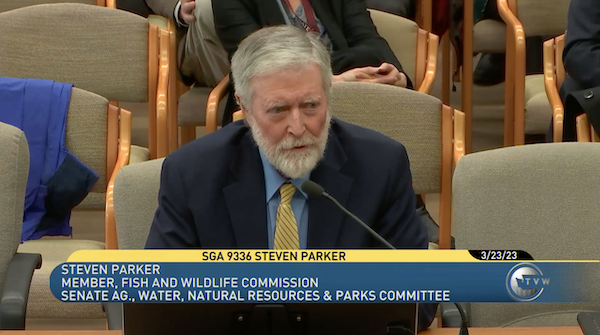
Last WDFW Commissioner Appears Before Senators; Votes Next For 3
Updated 3:35 p.m., Friday, March 24, 2023, in the fifth paragraph with word that five commissioners’ appointments have been placed on the Senate confirmation calendar.
Steven Parker, the ninth and final Washington Fish and Wildlife Commission member to appear this year before a state Senate committee, did so this afternoon, explaining his journey to the panel and taking questions from lawmakers.
The longtime Yakima Valley resident said one of the most important lessons he learned out of three decades of working as a Yakama Nation fisheries biologist is how to be effective in large groups with often opposing viewpoints, make progress and reach durable agreements, skills that might come in handy on the citizen panel that oversees WDFW policies at a time of competing theories in fish and wildlife management and a governor moving the commission from its traditional support base.

Parker said it wasn’t in his nature to get involved in “fairly pointless” tug-of-wars, rather to draw participants to the center so that everyone gets a little of what they need.
The public hearing on his gubernatorial appointment before the Senate Agriculture, Natural Resources and Parks Committee follows two earlier this week for Chair Barbara Baker and Commissioner Lorna Smith. All three are scheduled for a recommendation vote this coming Monday.
Last week, six fellow members received do-confirm nods and subsequent to this blog being published, on Friday five – Vice Chair Molly Linville and Commissioners Tim Ragen, John Lehmkuhl, Melanie Rowland and Jim Anderson – were placed on the Senate’s confirmation calendar. As of 3:30 p.m., Woody Myers appointment had not. Commissioners can serve without being confirmed by the upper chamber.
Parker said he’d grown up in Renton and that exploring tidepools at his grandfather’s house on the beach set him on his eventual career path, towards which he earned bachelors and masters in fisheries from the University of Washington.
He twice mentioned powerful formative experiences early in his career observing how Native Alaskans coexisted with predators. The second time he mentioned it was in response to a question from Sen. Kevin Van De Wege (D-Sequim) on his thoughts around carnivores and he was also asked by Sen. Shelly Short (R-Colville) about them.
The nut of it is that Parker said he’d like to thread the needle so that as a state Washington doesn’t eradicate “inconvenient wildlife,” while also finding a way that people and livestock producers can continue the activities and livelihoods they’re accustomed to. He lauded a long WDFW presentation on the matter last weekend.
Asked by Sen. Judy Warnick (R-Moses Lake) his thoughts around hunting, Parker said that he was a hunter in his younger days but no longer. But having worked for three decades for the Yakamas he’d seen how people take for granted the ability to harvest fish and wildlife and he said that relationship with natural resources was valuable and he respected it.
Usually in these hearings Van De Wege or Sen. Jesse Salomon (D-Shoreline) ask commissioners about Columbia gillnetting, but instead Van De Wege pointed out that Parker is one of two former tribal employees now on the state Fish and Wildlife Commission – retired Northwest Indian Fisheries Commission executive director Jim Anderson is the other – and he wanted to know Parker’s thoughts on the push and pull of that.
Parker said he looked at it as both the tribe and state working towards the same end, “the preservation and sustainability” of Washington’s fish and wildlife. He said he didn’t see them as opposed interests and spoke to “settled law” around comanagement.
In response to Warnick’s question, Parker also added that he wasn’t coming to the commission with an agenda and that he is reluctant to project his values on the panel. He said he was uncomfortable around values slipping into policy debates and described himself as “open to strong, compelling arguments” on issues.
Even if by now the whole ceremony of trotting commissioners in front of senators is as rote as this inevitable writeup, doing so many in such a compressed timeframe does offer insights into where Governor Jay Inslee is taking it with his appointments.
Five of the nine members have been named since January 2021, six if you include Baker’s reappointment in early March, at which time Inslee said, “Our Washington Fish and Wildlife Commission shoulders many complex and sometimes controversial issues, and as the climate changes, their responsibilities only increase. I am proud to welcome these three commissioners who will work hard to help our state protect and sustain its unique and cherished fish and wildlife.”
All comments before lawmakers were made under an oath of truth.
For previous coverage, see “Fish And Wildlife Comm’s Baker, Smith Go Before Senators“; for John Lehmkuhl, Melanie Rowland and Jim Anderson’s hearing, see “More WDFW Commissioners Appear Before Senate Committee“; and for Molly Linville, Tim Ragen and Woody Myers, see “3 WDFW Commissioners Appear Before Senate Committee; 3 More Due.”

